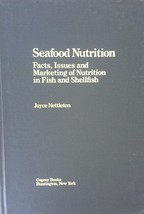Seafood Nutrition : Facts, Issues and and similar items
Seafood Nutrition : Facts, Issues and Marketing of Nutrition in Fish & Shellfish
£2.22 GBP
View full item details »
Shipping options
Seller handling time is 1 business day Details
No shipping price specified to GB
Ships from
United States

Return policy
Refunds available: See booth/item description for details
Purchase protection
Payment options
PayPal accepted
PayPal Credit accepted
Venmo accepted
PayPal, MasterCard, Visa, Discover, and American Express accepted
Maestro accepted
Amazon Pay accepted
Nuvei accepted
View full item details »
Shipping options
Seller handling time is 1 business day Details
No shipping price specified to GB
Ships from
United States

Return policy
Refunds available: See booth/item description for details
Purchase protection
Payment options
PayPal accepted
PayPal Credit accepted
Venmo accepted
PayPal, MasterCard, Visa, Discover, and American Express accepted
Maestro accepted
Amazon Pay accepted
Nuvei accepted
Item traits
| Category: | |
|---|---|
| Quantity Available: |
Only one in stock, order soon |
| Condition: |
Brand New |
| ISBN: |
9780943738123 |
| Language: |
English |
| Publication Year: |
1986 |
| Product Type: |
Textbook |
| Subject: |
Science & Tech |
| ISBN-10: |
0943738121 |
| ISBN-13: |
9780943738123 |
| Format: |
Book, Trade Cloth |
Listing details
| Shipping discount: |
Shipping weights of all items added together for savings. |
|---|---|
| Posted for sale: |
More than a week ago |
| Item number: |
379750985 |
Item description
Seafood Nutrition : Facts, Issues and Marketing of Nutrition in Fish Shellfish
by J. Nettleton, 1986, hardcover
Condition: Brand new.
See pictures for Table of Contents
Series: Osprey Seafood Handbooks
Hardcover: 280 pages
Publisher: Osprey Books; First Edition edition (February 1986)
Language: English
ISBN-10: 0943738121
ISBN-13: 978-0943738123
Product Dimensions: 10.3 x 7.1 x 1 inches
Shipping Weight: 32 ounces
There is unprecedented interest in the relationships between seafood and health. The unique fatty acids in fish oils, known as omega-fatty acids, appear to have metabolic properties that are associated with a lower risk of heart disease. Much excitement has been generated by the research findings. In order to extend our limited understanding of how these molecules affect health, the National Institutes of Health plans to devote a substantially increased budget to the study of fish oils. Hopes and expectations are very high.
There are several apparent paradoxes in the enthusiasm for fish oils. The most notable of these is that while the virtue of seafood has always been its extraordinarily low fat and cholesterol content compared with other protein foods, omega-3 fatty acids are most abundant in high fat fish and in fish liver oil. Seafood may now be found to be especially healthy because of its fat. And high
fat species may be particularly advantageous.
Will consumers seeking omega-3 fatty acids eat more seafood or patronize the health food store for a bottle of fish oil capsules? This question is of special concern to nutritionists and health professionals because enchantment with capsules and potions reinforces the myth that refined supplements are necessary for good health. Fish oil preparations may also pose the risk of hazardous levels of fat soluble vitamins, environmental contaminants and cholesterol. Many such preparations on the market today do not give information about the purification procedures used (if any), the vitamin levels or the cholesterol content. And they charge a very high price! The question is also, of course, of particular concern to the seafood, food service and retail food industries, who stand to benefit enormously if eating fish is generally perceived to be a major contributor to good health.
We know that the benefits of regular fish consumption take years to detect, are imperceptible to the consumer and are manifested by health problems avoided rather than by pleasures immediately enjoyed. We do not know how much, or how little, fish oil is needed to confer a benefit; but there is suggestive evidence that even lean fish, which have comparatively small amounts of omega-3 fatty acids, may be useful. Medical researchers, nutritionists and seafood fanciers are an optimistic lot who are supporting the prospect of seafood being uniquely important for optimum health. The next few years promise exciting and useful advances in our understanding of the part that seafood can play in our health and welfare.
Loading
This item has been added to your cart
 Seafood Nutrition : Facts, Issues and Marketing of Nutrition in Fish & Shellfish added to cart.
Only one available in stock
Seafood Nutrition : Facts, Issues and Marketing of Nutrition in Fish & Shellfish added to cart.
Only one available in stock
View Cart or continue shopping.
 Please wait while we finish adding this item to your cart.
Please wait while we finish adding this item to your cart.
Get an item reminder
We'll email you a link to your item now and follow up with a single reminder (if you'd like one). That's it! No spam, no hassle.
Already have an account?
Log in and add this item to your wish list.







